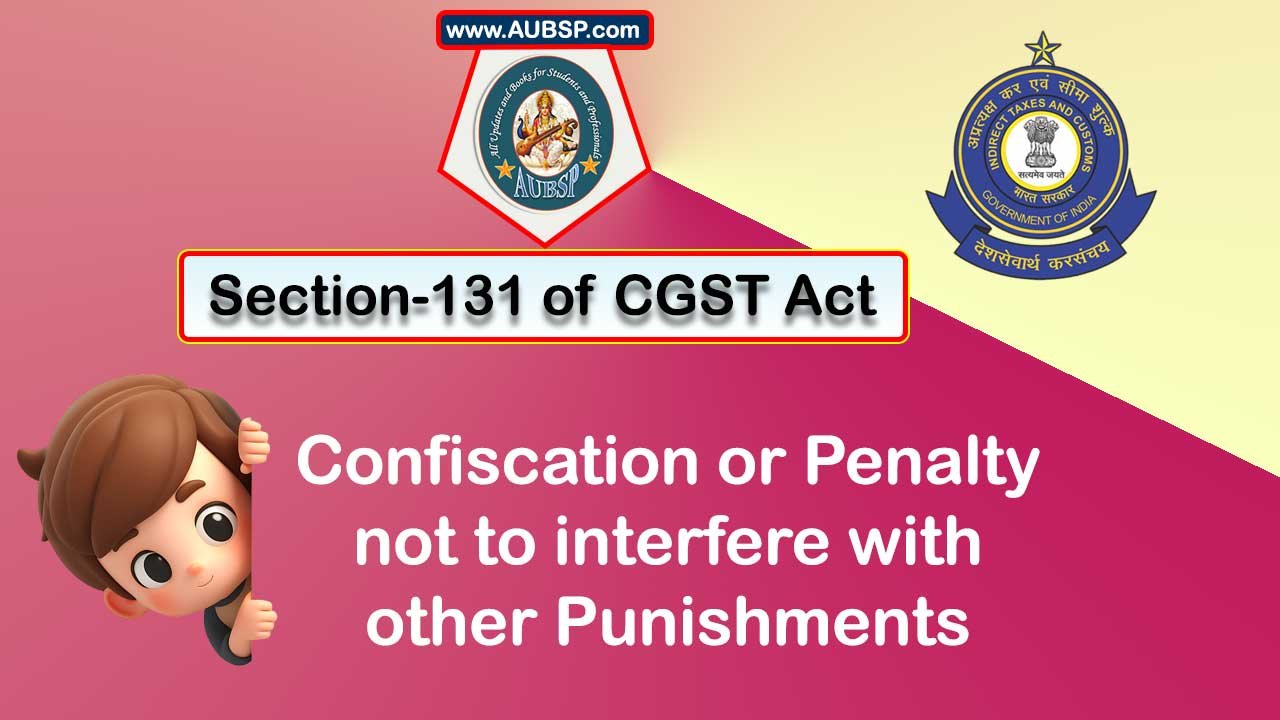Amended and updated notes on section 131 of CGST Act, 2017. Detail discussion on provisions and rules related to confiscation or penalty not to interfere with other punishments.
Chapter XIX (Sections 122–138) of the Central Goods and Services Tax Act, 2017 deals with the provisions related to offences and penalties. Section 131 of CGST 2017 provides for confiscation or penalty not to interfere with other punishments.
Recently, we have discussed in detail section 130 (Confiscation of goods or conveyances and levy of penalty) of CGST Act 2017. Today, we learn the provisions of section 131 of Central GST Act 2017.
Section 131 of the Central Goods and Services Tax Act, 2017 has been notified by the Ministry of Finance vide Notification No. 9/2017-Central Tax, G.S.R. 658(E), dated 28.06.2017. This notification was come into force from 1st July, 2017 i.e. the commencement date of section 131 is 1-7-2017.
| Name of Act | The Central Goods and Services Tax Act 2017 |
|---|---|
| Enacted by | Parliament of India |
| Administered by | Central Board of Indirect Taxes & Customs |
| Governing body | GST Council |
| Number of Chapters | 21 |
| Number of Sections | 174 |
| You are reading: | |
| Chapter No. | XIX |
| Chapter Name | Offences and Penalties |
| Section No. | 131 |
| Section Name | Confiscation or penalty not to interfere with other punishments |
| Updated 2025 Edition | GST Law Book PDF |
Section 131 of Central GST – Confiscation or penalty not to interfere with other punishments1
Section 131 of CGST Act 2017 shall come into force on 01.07.2017 vide Notification No. 9/2017-Central Tax, G.S.R. 658(E), dated 28.06.2017.
Without prejudice to the provisions contained in the Code of Criminal Procedure, 1973, no confiscation made or penalty imposed under the provisions of this Act or the rules made thereunder shall prevent the infliction of any other punishment to which the person affected thereby is liable under the provisions of this Act or under any other law for the time being in force.
- Section 131 of CGST Act 2017 shall come into force on 01.07.2017 vide Notification No. 9/2017-Central Tax, G.S.R. 658(E), dated 28.06.2017. ↩︎
Notes on Section 131 of CGST Act
Section 131 of the Central Goods and Services Tax (CGST) Act, 2017 states that if a person faces confiscation of goods or imposition of a penalty under the Act, it does not mean they are exempt from facing additional legal consequences under the same Act or any other law in force.
Independent Penalties and Punishments:
- The confiscation of goods or imposition of a penalty does not provide immunity from other legal proceedings.
- A person may still be liable for prosecution or additional penalties under the CGST Act or any other law.
No Conflict with Criminal Law:
- This section ensures that actions taken under the CGST Act do not interfere with provisions of the Code of Criminal Procedure, 1973 (CrPC).
- If an offense under the CGST Act also constitutes a criminal offense (e.g., fraud, tax evasion, falsification of documents), proceedings under CrPC can still be initiated.
Multiple Legal Liabilities Possible:
- A taxpayer or business can face:
- Confiscation of goods and conveyance (Section 130 of CGST Act)
- Penalties under various provisions
- Prosecution and imprisonment under Section 132 for severe offenses
- Action under other laws, such as the Indian Penal Code (IPC) or Prevention of Money Laundering Act (PMLA).
Illustration:
- Suppose a trader illegally supplies goods without issuing invoices to evade tax.
- The goods and conveyance may be confiscated, and a monetary penalty may be imposed under CGST provisions.
- However, if the act amounts to a serious offense (e.g., tax evasion exceeding ₹5 crore), the trader may also face criminal prosecution and imprisonment under Section 132 of the CGST Act.
- Additionally, if the act involves fraud or money laundering, proceedings under IPC or PMLA can also be initiated.
Section 131 ensures that penalties under GST laws do not prevent authorities from taking further legal action under the CGST Act or any other applicable law. It reinforces the idea that different legal consequences can apply simultaneously for tax-related offenses.

